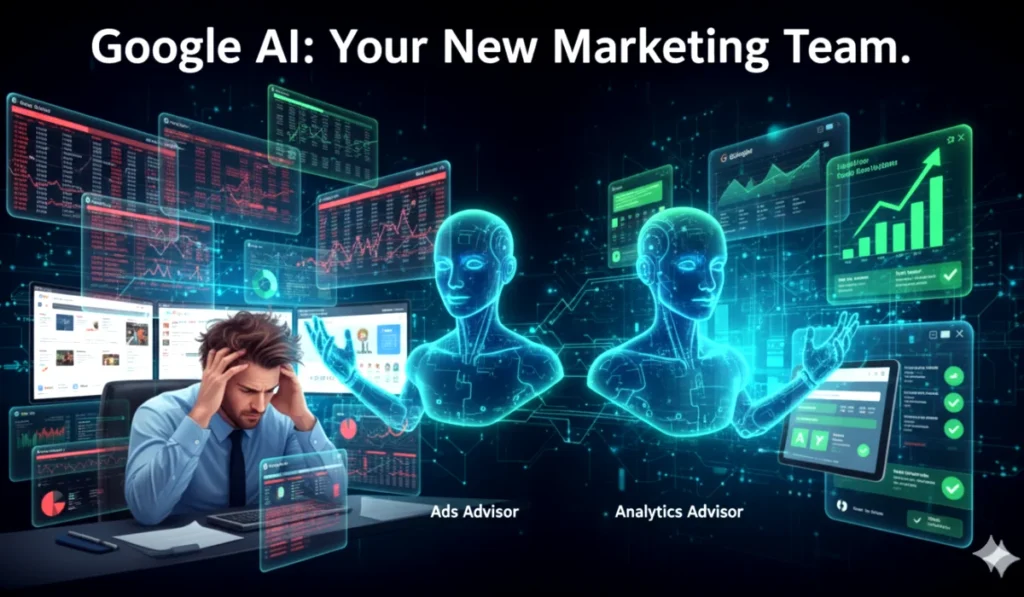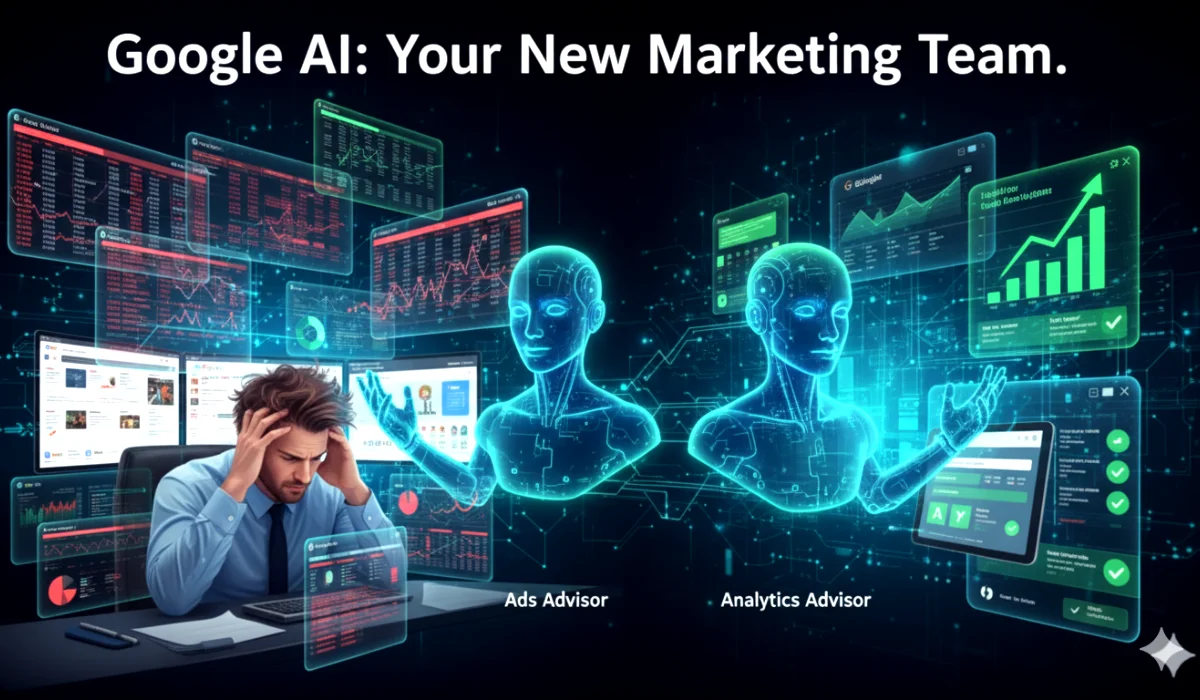Google has just fired the starting gun on the era of true marketing automation, announcing the global launch of two powerful AI agents: Ads Advisor and Analytics Advisor. This isn’t just another AI-powered suggestion tool or a smarter chatbot. These are autonomous agents, built on Google’s most advanced Gemini models, that can independently manage campaigns, diagnose performance issues, create new ad copy, and even fix policy violations—all while you sleep.
Expert Review: “For years, the promise of AI in marketing has been ‘smarter insights.’ Google’s new Advisors are the first real step towards ‘smarter actions.’ The ability of Ads Advisor to not just suggest but implement changes like bid adjustments and creative updates is a monumental leap. Analytics Advisor turns every marketer into a senior data analyst. This isn’t a flop; this is the new foundation of digital advertising. The brands that master these tools first will gain an insurmountable competitive advantage. The only potential pitfall is over-reliance; human oversight and strategic direction are still paramount.”

Meet Your New AI Teammates: Ads Advisor & Analytics Advisor
Think of these agents not as tools, but as two new, hyper-intelligent junior members of your marketing team who work 24/7.
- Ads Advisor is your new Campaign Manager. It lives inside Google Ads and is focused on execution and optimization. It can take a high-level goal, like “optimize my campaign for the holiday season,” and autonomously perform the tasks needed to achieve it.
- Analytics Advisor is your new Data Analyst. It lives inside Google Analytics and is focused on insight and interpretation. It can take a complex question, like “why did our traffic suddenly drop yesterday?” and not only give you the answer but also recommend the next steps.
The key difference between these agents and previous AI features is their autonomy. They don’t just suggest; they do.
How to Use Ads Advisor: Your Step-by-Step Guide to Autonomous Campaigns
When Ads Advisor rolls out to your Google Ads account, it will appear as a new conversational interface. Mastering it will be about giving clear, goal-oriented commands.
Step 1: The Initial Command
Start with a clear, strategic goal. Instead of asking it to “increase bids,” give it a business objective.
- Good Prompt: “Optimize my Performance Max campaign for the upcoming Black Friday sale.”
- Good Prompt: “Generate new headlines and ad copy for my ‘summer collection’ campaign based on our best-performing assets from last quarter.”
- Bad Prompt: “Change my ad keywords.”
Step 2: Review and Approve the AI’s Plan
Ads Advisor will analyze your account and propose a multi-step action plan. For the Black Friday prompt, this might include:
- Action 1: “I will create new sitelink extensions featuring your ‘Black Friday Deals’ landing page.”
- Action 2: “I will adjust bids to be more aggressive for users who have previously visited your site.”
- Action 3: “I will generate three new ad headlines focused on ‘limited-time offers’ and ‘doorbuster deals’.”
You will have the chance to review and approve each of these actions before the AI implements them.
Step 3: Troubleshooting and Policy Fixes
This is one of the most powerful features. If an ad is disapproved, you can now ask the AI for help.
- Good Prompt: “This ad was disapproved for ‘malicious software.’ Can you diagnose and fix the issue?”
- What it Does: Ads Advisor will analyze the landing page, identify the problem (e.g., an incorrect URL or a script that violates policy), and in many cases, will suggest a fix or even apply it directly with your permission.
How to Use Analytics Advisor: Becoming a Data Genius
Analytics Advisor is designed to eliminate “data paralysis” by turning complex analytics into simple conversations.
Step 1: Ask Natural Language Questions
Forget about custom reports and complex segments. Just ask what you want to know.
- Good Prompt: “Why did our traffic from organic search drop by 20% on Monday?”
- Good Prompt: “Which of my campaigns is driving the most valuable users this month?”
- Good Prompt: “Give me a summary of my website’s performance this week compared to last week.”
Step 2: Understand the “Why” with Key Driver Analysis
The agent doesn’t just give you a number; it tells you the story behind the number. For the traffic drop question, it will automatically perform a key driver analysis and might respond with:
- Answer: “The 20% drop in organic traffic was primarily caused by a 35% decrease in traffic from your ‘holiday gifts’ keyword group, which seems to be related to a competing brand launching a major sale on the same day.”
Step 3: Get Actionable Recommendations
Crucially, Analytics Advisor connects insights to actions. After identifying the problem, it will suggest concrete next steps that align with your business goals.
- Recommendation: “To recover this traffic, I recommend you create a new promotion for the ‘holiday gifts’ category and ask Ads Advisor to launch a new ad group targeting users searching for your competitor’s sale.”
The Verdict: Is This a Good Thing or a Flop?
Based on the announced capabilities, Google’s AI Advisors are poised to be a massive success and a significant leap forward for the industry.
- The Good: These tools will democratize expertise. Small businesses without large marketing teams can now access a level of optimization and data analysis that was previously reserved for large agencies. They will free up human marketers to focus on strategy, creativity, and customer relationships—the things humans do best.
- The Potential Problems: The biggest risk is over-reliance and complacency. If marketers simply “set it and forget it,” they risk the AI optimizing for the wrong local maxima, missing broader market shifts, or creating generic, uninspired ad copy. The AI is a powerful teammate, but it is not a strategic replacement for a human marketer. There is also the risk of bugs or the AI making a mistake that, if not caught by a human, could lead to wasted ad spend.
The final verdict is overwhelmingly positive. These tools are not a flop. They are the future, but they require a new kind of marketer to pilot them—one who can provide clear strategic direction and intelligent human oversight.
Frequently Asked Questions (FAQs)
1. What are Google’s Ads Advisor and Analytics Advisor?
They are new, autonomous AI agents built into Google Ads and Google Analytics that can manage campaigns and analyze data with minimal human input.
2. How are they different from other AI tools?
They are “agentic,” meaning they can take action on their own, such as creating new ads, adjusting bids, or fixing policy issues, rather than just providing suggestions.
3. When will these AI agents be available?
They will begin rolling out globally to all English-language Google Ads and Analytics accounts in early December 2025.
4. Are these AI agents free to use?
Yes, they will be integrated into the existing Google Ads and Google Analytics platforms at no extra cost.
5. What AI model powers these agents?
They are powered by Google’s advanced Gemini family of models, the same technology behind Google’s most capable AI products.
6. Can Ads Advisor create new ad creatives for me?
Yes, Ads Advisor can generate new headlines, descriptions, and keywords based on your best-performing assets and your website’s content.
7. Can I trust Ads Advisor to make changes to my account?
The AI will propose an action plan that you must review and approve before it makes any changes to your campaigns. You remain in control.
8. What kind of questions can I ask Analytics Advisor?
You can ask broad questions like “How is my site doing?” or very specific ones like “Why did my conversion rate drop for users on mobile devices last Tuesday?”
9. Will these AI agents replace human marketers?
No, the goal is to augment human marketers, not replace them. The agents handle repetitive, time-consuming tasks, freeing up humans to focus on high-level strategy, creativity, and client relationships.
10. Do I need to be a data scientist to use Analytics Advisor?
No. The tool is designed to be used with natural, conversational language, making advanced data analysis accessible to anyone, regardless of their technical skill level.
11. What happens if Ads Advisor makes a mistake?
All changes made by the AI are tracked in a change history. You can review all actions and revert any changes that you do not agree with.
12. Can Ads Advisor help with Performance Max (PMax) campaigns?
Yes, Ads Advisor is specifically designed to provide tailored recommendations and apply optimizations for Performance Max and Search campaigns.
13. What languages are supported at launch?
At launch in December 2025, the agents will only be available for English-language accounts. Support for other languages is expected to follow in 2026.
14. How do these agents learn?
They learn from your interactions over time. The more you use them and provide feedback on their recommendations, the more personalized and effective they will become.
15. Is my data safe when using these agents?
Google states that the agents operate within their strict privacy policies and that your unique business data is used to provide personalized recommendations for your account only.
16. What is “key driver analysis”?
This is an advanced analytical technique used by Analytics Advisor to automatically identify the root cause of a change in your data, such as a sudden drop in traffic or sales.
17. Will this give Google even more control over advertising?
This is a common concern. While the tools provide powerful automation, the ultimate control over strategy and budget remains with the advertiser. It’s crucial for marketers to actively manage the AI, not just follow its recommendations blindly.
18. How can I prepare my team for these new tools?
Start by educating your team on the principles of agentic AI. Encourage them to think about marketing in terms of strategic goals that can be delegated to an AI, rather than a list of manual tasks.
19. What if I don’t want to use the AI agents?
You can continue to manage your campaigns manually. The agents are a powerful new feature, but they are not mandatory.
20. Where can I find the agents in my Google accounts?
When they roll out, Ads Advisor will appear as a new conversational interface within the Google Ads platform, and Analytics Advisor will be accessible within Google Analytics.
SOURCES
- https://blog.google/products/ads-commerce/ads-advisor-and-analytics-advisor/
- https://www.startuphub.ai/ai-news/ai-research/2025/google-ai-advisors-reshape-digital-ad-management/
- https://www.thekeyword.co/news/google-launches-ads-advisor-to-generate-campaign-ideas
- https://www.seroundtable.com/google-ads-advisor-analytics-advisor-live-40415.html
- https://searchengineland.com/google-launches-ai-powered-advisors-464571
- https://www.adweek.com/media/google-ai-agent-ads-analytics-advisor/
- https://www.adexchanger.com/ai/google-rolls-out-chatbot-agents-for-marketers/
- https://www.adventuredigital.com/en/blog/analytics-advisor-ga4-and-google-ads-ai-revolution-begins
- https://support.google.com/google-ads/answer/16574983?hl=en
- https://www.w3era.com/news/ppc/google-ads-analytics-advisor-launch/



